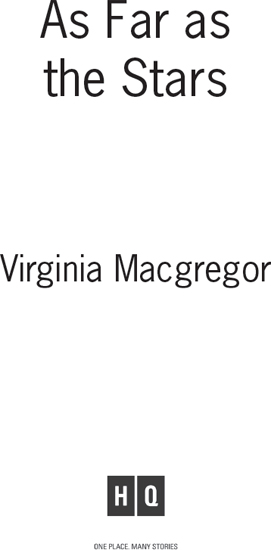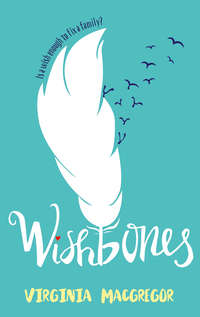
Полная версия
As Far as the Stars

VIRGINIA MACGREGOR is the author of What Milo Saw, The Return of Norah Wells, Before I Was Yours, You Found Me and the young adult novel Wishbones. Her fifth novel for adults, The Children’s Secret, will be out in the UK in November 2019. Her work has been translated into over a dozen languages. After graduating from Oxford University, she worked as a teacher of English and Housemistress in three major British boarding schools. She holds an MA in Creative Writing and now writes full time. Virginia is married to Hugh, who is Director of Theatre at St. Paul’s School in Concord, New Hampshire. They moved to New Hampshire from the UK in July 2016 and live at St. Paul’s with their two daughters, Tennessee Skye and Somerset Wilder and by the time this novel is published, they will have a new little boy too.

Copyright

An imprint of HarperCollins Publishers Ltd
1 London Bridge Street
London SE1 9GF
First published in Great Britain by HQ in 2019
Copyright © Virginia Macgregor 2019
Alice Feeney asserts the moral right to be identified as the author of this work.
A catalogue record for this book is available from the British Library.
This novel is entirely a work of fiction. The names, characters and incidents portrayed in it are the work of the author’s imagination. Any resemblance to actual persons, living or dead, events or localities is entirely coincidental.
All rights reserved under International and Pan-American Copyright Conventions. By payment of the required fees, you have been granted the non-exclusive, non-transferable right to access and read the text of this e-book on-screen. No part of this text may be reproduced, transmitted, downloaded, decompiled, reverse engineered, or stored in or introduced into any information storage and retrieval system, in any form or by any means, whether electronic or mechanical, now known or hereinafter invented, without the express written permission of HarperCollins.
Ebook Edition © April 2019 ISBN: 9780008217334
PRAISE FOR VIRGINIA MACGREGOR:
‘I defy you not to fall in love’
Clare Mackintosh
‘Warm, wise and insightful’
Good Housekeeping
‘Sharp, funny and hugely moving, this is a must-read’
Fabulous
‘Impossible not to fall in love’
Stylist
‘Touching and poignant’
Cathy Hopkins
‘Might restore your faith in human nature’
Bella
‘Will delight you but break your heart several times over’
The Sun
‘This wonderful story will tear at your heart’
My Weekly
‘Original, poignant and heart-warming’
Sadie Pearse
To my beloved husband, Hugh, who never stops believing in what I do.
Silently, one by one, in the infinite meadows of heaven, Blossomed the lovely stars, the forget-me-nots of the angels.
Henry Wadsworth Longfellow
Evangeline: A Tale of Acadie
Contents
Cover
About the Author
Title Page
Copyright
PRAISE
Dedication
Epigraph
DAY 1: SATURDAY 19TH AUGUST, 2017
Prologue
Chapter One
Chapter Two
Chapter Three
Chapter Four
Chapter Five
Chapter Six
Chapter Seven
Chapter Eight
Chapter Nine
Chapter Ten
Chapter Eleven
Chapter Twelve
Chapter Thirteen
Chapter Fourteen
Chapter Fifteen
Chapter Sixteen
Chapter Seventeen
Chapter Eighteen
DAY 2: SUNDAY 20TH AUGUST, 2017
Chapter Nineteen
Chapter Twenty
Chapter Twenty-One
Chapter Twenty-Two
Chapter Twenty-Three
Chapter Twenty-Four
Chapter Twenty-Five
Chapter Twenty-Six
Chapter Twenty-Seven
Chapter Twenty-Eight
Chapter Twenty-Nine
Chapter Thirty
Chapter Thirty-One
DAY 3: MONDAY 21ST AUGUST, 2017
Chapter Thirty-Two
Chapter Thirty-Three
Chapter Thirty-Four
Chapter Thirty-Five
Chapter Thirty-Six
Chapter Thirty-Seven
Chapter Thirty-Eight
Chapter Thirty-Nine
Chapter Forty
Chapter Forty-One
Chapter Forty-Two
Chapter Forty-Three
Chapter Forty-Four
Chapter Forty-Five
Chapter Forty-Six
Chapter Forty-Seven
DAY 4: TUESDAY 22ND AUGUST, 2017
Chapter Forty-Eight
Chapter Forty-Nine
One Year Later
Chapter Fifty
Chapter Fifty-One
Acknowledgements
About the Publisher
DAY 1
SATURDAY 19TH AUGUST, 2017
Prologue
On the I-81, heading for Nashville, a yellow Buick comes to an abrupt halt.
A girl swerves onto the hard shoulder and hits the brakes.
Then she checks the message on her phone again.
Damn it!
She thumps the steering wheel.
She checks the clock on the dashboard, takes a breath and then puts the car back into gear.
She takes the next exit, gets back onto the I-81 and heads back to DC, praying that her brother’s plane will be on time.
A continent away, a pilot looks at the paper model sitting on the dashboard in his cockpit: a warbler, a tiny bird that can fly for three days across the Atlantic without landing.
He never takes it for granted: how miraculous this is, to be up here, hundreds of miles from the earth. And at night, to see the stars, up close.
He thinks of his son, who made the paper bird. In a few hours, they’ll be together and then a holiday, just the two of them. He’s going to try harder this time.
Beyond the paper bird, through the thick glass windows, the sky is that endless kind of blue. His eyes aren’t big enough to take it all in.
It’s morning. The day is starting.
It’s going to be a beautiful day, the pilot thinks. A beautiful flight. Not a whisper of wind. A smooth parabola through the sky from one continent to the other.
He’s done this route hundreds of times. Sometimes, he jokes that he could do it in his sleep.
He cranes his neck and looks down. They’re passing the west coast of Ireland. In a few more minutes they’ll leave behind the land and then, for thousands of miles, it’ll be just him and his passengers and crew, flying between sea and sky.
There are times when he’s so happy up here that he wishes he could fly for ever. That there was no land to go back to.
The plane is flying steady now. He switches the controls to autopilot; there’s no more need for his intervention, not for a good while.
He sits back and looks back out at the sky.
Across the Atlantic, at Dulles International Airport in DC, a seventeen-year-old boy waits by the arrivals gate. He sits on the floor, his back pressed into the wall.
It’ll be hours before his father’s plane lands, but he doesn’t mind waiting. Airports are like home for him. He’s good at blocking out the noise and the people. All those comings and goings.
He pulls a scrap of paper out of his backpack and starts folding.
A few miles off the coast of western Ireland, where the sea is so deep it’s black, a fisherman stands in his boat, pulling in a net. He’s been out since before light.
He hears the drone of the engine before he sees the plane. He lives under the flight path, so over the years he’s become used to the sound, to how the rhythm of the planes weave between the currents of the sea.
But still, it takes him by surprise: to see them up there, those big metal birds, carrying all those people through the sky.
The sea he understands: a wooden raft floating on the waves is as ancient as the world. But the planes, they never seem quite right.
He holds up his hand and waves. He knows that it’s too far for the pilot to see him, but still, he likes to do it.
The sun’s so strong – the sky so blue – he has to close his eyes.
Behind his eyelids, there’s darkness and then stars. And when he blinks them away and tries to adjust again to the brightness, he thinks the plane will be gone – far off on its journey through the sky. A few moments peace until the next one.
But the plane hasn’t gone: it’s still there.
He’s familiar with this trick of time and distance, how it seems as though the planes are not moving at all, when really, they’re tearing through the sky faster than anything on land or sea.
He keeps staring at the plane, a straight, white arrow piercing the blue sky.
But then the plane seems to change direction. Its angle shifts. Its wings tilt to one side.
Maybe it’s steading itself, he thinks, having reached altitude. But usually the planes climb higher, especially the big airliners.
He blinks again.
Strangely, now, it looks like the plane is slowing down.
The fisherman rubs his eyes. I’m getting old, he tells himself. And I’m tired. I was up early; I’ve been staring at the sea for too long.
He thinks of going home. Of taking off his wet clothes. Of washing the salt from his skin and then climbing into bed for a few hours’ rest.
His eyes adjust.
He can see clearly now.
And then something makes him stand up in his boat and tilt his head up to the sky and wave frantically, even though he knows that no one can see him.
He’s not just tired. And his eyes are fine.
Something’s wrong.
The plane is no longer ascending. And it’s not adjusting its position. Its tail is too high in relation to its body; its nose is dipping. And though the force of the engines keep propelling the plane forward, there’s a strange stalling sound, a grinding through the air that echoes across the sea.
He watches and watches as the plane tilts and dips and slows.
And starts to fall.
Chapter One
12.25 EST Dulles International Airport, Washington DC
Even before I step into the arrivals lounge I see the chaos.
People push in and out of the sliding doors, their cells clamped to their ears.
Cars crowd the pick-up zone.
Everyone’s walking too fast.
I knew it would be busy: it’s the end of the summer and people are flying in for the solar eclipse. But this is insane.
As we get closer to the airport building, Leda lets out a long whine like someone’s stepped on her tail. Ever since we turned off the highway, she hasn’t let up: barking and yelping and doing that high-pitched whimpering thing.
Leda’s my brother’s dog. A small, scrappy, caramel-coloured mongrel with shiny black eyes and stiff, worn fur. She looks more like an old-fashioned teddy bear than a dog.
She’s cowering in the footwell like something’s spooked her.
And I can’t shake the feeling either: something’s wrong.
But I push the feeling down to the pit of my stomach. I can’t go there, not now. I have to focus.
Leda whines again.
‘Pipe down,’ I call back to her. ‘You’ll see him in a second.’
Leda’s been missing Blake all summer. I told Blake he should take her with him to London but he said Leda would be better off with me. Which is probably true. Just because Blake loves her, it doesn’t mean he remembers to feed her or walk her or let her out to pee.
I park the car a bit too close to the main walkway but it’s so busy it’s the only space I can find. And who’s going to moan about stumbling over a 1973 mustard yellow Buick convertible, right? I should charge a viewing fee.
Leda jumps up and down on the back seat, her ears flapping.
‘Okay, okay.’
I lift her out and then throw my telescope over my shoulder – it’s the only thing I’d mind being stolen from the car. In fact, I’d be delighted if someone stole the two dresses spread out across the back bench. One’s for the rehearsal dinner (yellow), one’s for the wedding (sky blue): both sewn by Mom. They’re the kind of dresses I wouldn’t be caught dead in, not in real life, but my big sister, Jude, is getting married, and that’s a big deal, so I gave in.
For the past year and a half, everything’s been about my sister, Jude’s, wedding. At least all this will be over soon and we’ll be able to go back to our normal lives.
As I walk to the terminal entrance I get out my cell and text Blake:
Hurry. You can smoke in the car.
I hate it when Blake smokes when he’s driving, but if we wait for him to have a smoke outside he’ll end up talking to someone and then he’ll want to take down their cell number (Blake’s got more friends than any sane person can remember), and then he’ll notice the colour of the sky or a sad-looking piece of trash on the sidewalk and feel inspired to write down some lyrics. And then he’ll find a reason to have a second cigarette and he’ll suggest we take a detour somewhere, for the hell of it, and before we know it, we’ll have missed the whole wedding.
And, besides Jude and Stephen, the bride and groom, if there’s one person this wedding can’t go ahead without, it’s Blake. He’s singing the song. The song.
When I step into the arrivals lounge, things look even worse.
The people clutching the flowers and Welcome Home banners don’t look like they’re meant to look: bouncy with excitement about seeing whoever it is they came to collect. They look stressed out.
A red-faced man has one of the airport staff by his shirt collar and is yelling into his face.
The something’s wrong feeling pushes back up my oesophagus and I get that biley taste at the back of my throat.
It has nothing to do with you, I tell myself. Just focus on finding Blake.
I breathe slowly in and out until I feel better.
I check my phone again and read Blake’s last message:
ETA: 10.15am.
Followed by another message a few minutes later:
See you at Dulles.
Dulles! As in Dulles International Airport in Washington DC.
DC is where we live. And Dulles is the airport Blake’s flown in and out of a million times. I’ve lost track of the number of Heathrow-Dulles flights I’ve booked for him. I joke that I’m the one who always brings Blake home, to our small apartment in Washington, to our family. You’re my guiding star, Air, he jokes. Only it’s not a joke: if it weren’t for me, God knows where Blake would end up.
Which might be the reason he got confused – maybe he thought he was just flying into Dulles, coming home, as usual, and that I’d pick him up and that we’d drive to the wedding together.
But that wasn’t the plan. And I’d told him the plan a million times:
Mum, Dad and Jude were driving down to Nashville a week ahead to make preparations for the wedding.
I’d follow a few days later.
And I’d pick him up at Nashville airport and bring him to the hotel.
Book a flight to Nashville, I’d told him, over and over, knowing it would take a while to sink in.
Nashville is where the wedding is taking place. It’s the city where Dad grew up and took us for every holiday when we were kids. And it’s the city Blake loves more than anywhere in the world.
It made sense for him to fly straight into Nashville: it allowed him to squeeze in a few extra gigs in London before the wedding. He’d already complained about having to cut his UK tour short.
I look at my phone again. I still can’t believe that he flew into Dulles. Seriously? The airports are 700 miles apart, in totally different states – in different time zones for Christ’s sake. It’s not like they’re easy to mix-up.
Though I shouldn’t be surprised. Blake is mess-up central.
Two days ago, I got this random voicemail from him. It wasn’t even from his phone – which is why I didn’t pick up. He explained that he’d lost his cell and that he was borrowing a phone. There was so much noise in the background that he was shouting. He was probably at a gig.
Then he landed the bombshell:
Can you book the return flight for me? Run out of cash. Thanks sis, got to go. Love you.
Casual. Totally casual.
Blake only ever books one-way tickets. His plans are constantly changing, so it doesn’t make sense to book more than a few days ahead. And he’s always short of cash. So I guess I shouldn’t have been surprised. Only, this was different: it was forty-eight hours before our sister’s wedding.
And I’d reminded him – like a thousand times – that he had to book a return flight well in advance.
But had he listened to any of my very clear instructions about the wedding? About where it was taking place and when and at what time and which airport he had to fly into?
No. Obviously, no.
And, two nights ago, when he left that message, saying that he hadn’t booked his flight yet – like it was nothing – did I bail him out, again?
Yes. Obviously, yes.
So, even though it was three in the morning and I was so tired I could barely keep my eyes open, I got out the debit card Mom and Dad set up for me, and booked the flight from Heathrow to Nashville, as planned.
Jude, Blake and I all have a card with separate accounts set up in our names. It’s Mom and Dad’s way of teaching us to be responsible with money. Only Blake keeps maxing his out and then I have to bail him out with my card. The thing is, Mom gets alerts when any of us spend more than $50 so I texted her, explaining that Blake had forgotten to book a return ticket and that he didn’t have any money but that she didn’t need to worry, I was on it. Everything was going to be fine. Blake messing up is a scenario she’s familiar with. She answered with: OK. Just get him here.
Mom never blames Blake for anything. She never even blames him for maxing out his debit card. She’s got this massive blind spot where he’s concerned. Being pissed off at how Mom is totally soft when it comes to Blake is one of the few things Jude and I bond over.
Then I sent a text message to the phone he’d called from with the flight details for the totally overpriced last-minute ticket. That I’d meet him at Nashville airport and take him to the hotel.
I sent him a few other texts too, not caring what stranger would read them first, telling him how pissed I was that he’d woken me up and how expensive the flight was and that he’d better be on time.
He never answered any of my texts.
I don’t really believe in praying: I don’t think anyone out there is listening. Except, perhaps, some life form on a planet we haven’t discovered yet. But not a God-like figure. Not someone who directs our lives. That night, though, I found myself begging that if there was some force out there who decided whether things work out or get fucked up, that Blake would get my messages. That whoever he’d borrowed a phone from would pass them on. That he wasn’t some random guy off the street that Blake would never see again.
I guess I begged – or prayed, or whatever – because I knew that this time Blake had to get his shit together. That he had to make it back for the wedding.
The next time I heard from him was the text he sent me when I was halfway to Nashville saying that he was landing in Dulles. The text was from a different number, probably another phone he borrowed.
You mean Nashville!
I’d texted back.
No. Dulles. See you soon, sis.
And then nothing.
Had he not received any of my messages when I booked his flight? Did he end up booking a flight on his own? He was always borrowing money off people; maybe he’d found a way to pay the airfare. And then he’d got it wrong: he thought we were meant to meet up in Dulles and drive down to Nashville together. But that had never been the plan. I’d explained it to him.
But then Blake’s not good at listening. Not when it comes to practical, everyday stuff.
So, this was another typical Blake fuck-up. Only worse: a fuck-up on top of a fuck-up.
I clench my hands, digging my fingernails into my palms.
Focus, I think. Just focus on finding Blake.
I’m really late. Two hours late. So, I guess all these stressed-out looking people, they’ve been here for a while already.
There’s a toddler screaming. But besides him and the red-faced yelling guy, everything’s a weird kind of quiet, people walking around with wide, glazed eyes like they’ve lost something.
I’ve been to this airport more times than I can remember – I’m Blake’s personal taxi service – and it’s never felt like this. And when I see how lost those people look, I feel bad – like I should be asking them if I can help or something – but I don’t have time to be helpful in other people’s lives right now: I’ve got to find Blake, get him into the car and start driving.
That’s if he’s even here. Knowing Blake, he’s probably got on a plane to Hawaii or Iceland or bloody Timbuktu.
I check my phone again.
No. Dulles. See you soon, sis.
Though, in the grand-Blake scheme of things, his message doesn’t really mean much. I’ve lost count of the number of times he’s told me where he’s planning to go, only to find out that he’s ended up somewhere else altogether.
Maybe his brain went into autopilot; maybe he thought he was coming home to DC, like he usually does. Or maybe his brain was tired or hungover or in its general state of Blake-like distraction and he texted Dulles because that was what he was used to texting.
Maybe, at this exact moment, he’s standing at the arrivals gate of Nashville International Airport – like he was meant to all along.
God, I shouldn’t have turned the car round. I should have gone to Nashville as planned, assumed that he was on the plane I’d booked for him, ignored his random text.
If you made me drive all the way to Dulles for nothing, I’m not doing anything for you ever again, I say to him in my head. And this time, I mean it.
Dulles. Nashville. Dulles. Nashville. The words crash around in my brain.
Where the hell are you, Blake?
He should have some kind of electronic tag.
I take a breath.



